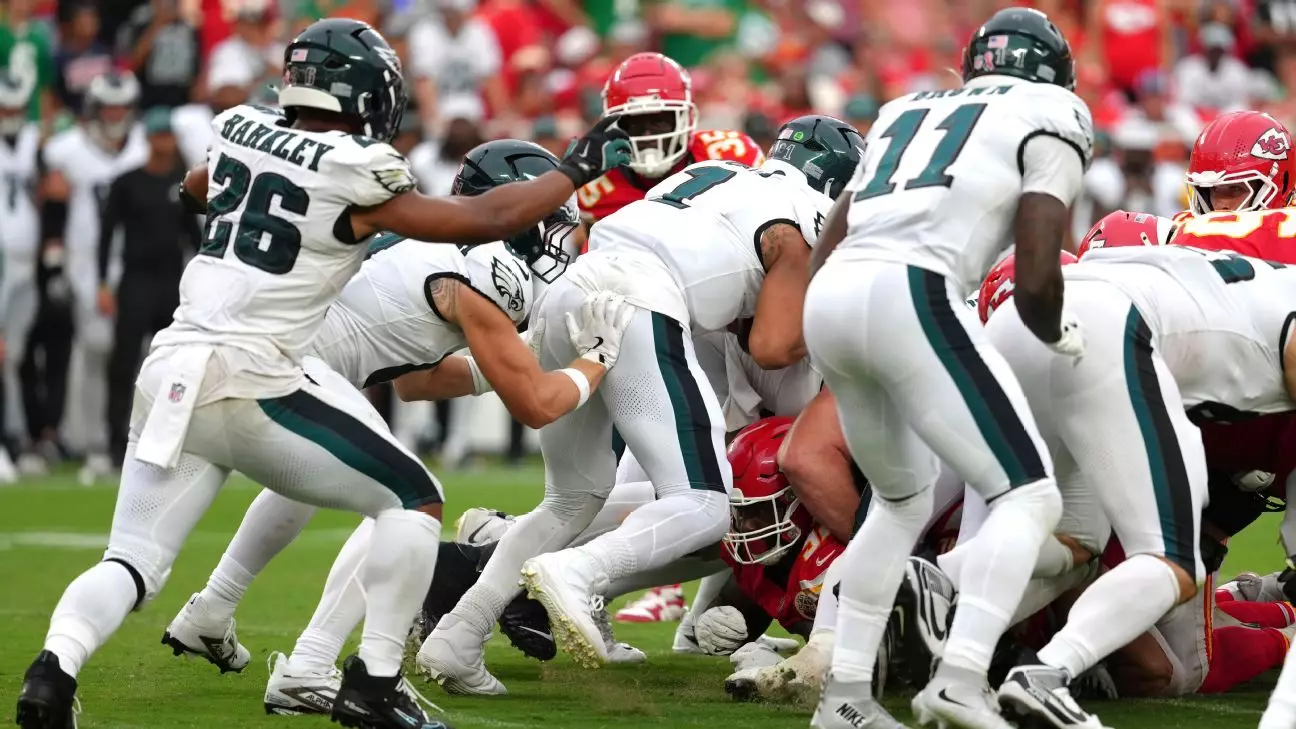In recent weeks, the controversy surrounding the so-called “tush push” or QB sneak has ignited debates that go beyond mere play analysis — they reveal a deeper, systemic concern about fairness, consistency, and integrity in the NFL. The league’s stance, marked by an explicit directive to officiate the play “tight,” exposes an unsettling double standard. While referees are instructed to scrutinize the Eagles’ successful formations, similar efforts and movements by opponents often escape penalty or review. This inconsistent enforcement creates a gaming of the system, privileging certain teams and plays over others based on subjective judgment and perhaps, unspoken favoritism.
The NFL’s recent internal memo indicates a worrying bias: they want the tush push called more stringently, punishing even minimal infractions. Yet, when other teams execute comparable formations or get off the line early, they typically aren’t flagged. This disparity raises fundamental questions about whether the league is truly committed to fair play or merely tailoring officiating to protect the league’s marquee players and popular plays. The impression is that certain teams, like the Eagles, are being scrutinized more intensely, eroding trust among fans who crave a level playing field.
The Politics of Play and the Need for Consistency
The league’s decision to institute tighter calls appears to be motivated less by a desire for fairness and more by a reaction to mounting criticism over the play’s legality and its impact on the game. Having nearly perfected the conversion rate — a staggering 96.6% since 2022 — the Eagles have made the tush push an almost unstoppable tactic. Such dominance threatens to diminish the strategic diversity that makes football compelling, prompting the NFL to lean towards stricter officiating as a way to curb its effectiveness.
This move reflects a broader tendency within the league to intervene selectively, rather than applying rules uniformly. When Andy Reid suggests the play was “a little early” on some instances, it subtly insinuates inconsistency that fans and players alike find frustrating. The game should be about skill, timing, and strategy, not navigating a minefield of ambiguous rules tailored to specific plays or teams. It is a dangerous precedent when the league’s officiating staff, consciously or unconsciously, picks winners and losers based on their interpretation of the rules — a dynamic undermining the very foundation of competitive fairness.
The Play’s Place in Football’s Future and the League’s Hesitance
Despite mounting pressure, attempts to ban or regulate the tush push have failed, with the NFL’s own voting process revealing ambivalence and reluctance. A proposal that could have curtailed this maneuver narrowly missed passing, signaling a league hesitant to fully confront the play’s dominance. Such reluctance reveals a fundamental conflict: the NFL recognizes the play’s controversial nature but fears alienating fans and players who enjoy the physical, gritty aspect of it.
At the heart of this debate lies a critical question: Is the tush push an innovative evolution of football or a loophole that exposes the league’s inconsistent enforcement? For liberal-minded centrists supporting fair and transparent competition, the clear answer leans towards concern. The league’s inconsistency fosters an uneven playing field, disproportionately benefiting teams with larger, more physical offensive lines, like the Eagles, at the expense of strategic diversity and fairness.
While some may argue that the play is within the rules, the ongoing officiating crackdown suggests a recognition that its current implementation undermines the spirit of fair sport. The league’s sensitivity to criticism and its tailored enforcement strategies reveal a defensive posture that threatens to erode public trust. Fans, players, and analysts deserve a game where rules are applied equally, not curated to favor a particular play style or team, especially when it’s so overwhelmingly effective.
The controversy over the tush push epitomizes broader tensions within the NFL: the struggle between tradition and innovation, enforcement consistency and favoritism, fairness and spectacle. As the league attempts to impose tighter officiating, it must question whether superficial rules and selective judgment will truly serve the interests of honest sport or merely mask deeper inequities embedded within its culture.


Leave a Reply